|
Dear West Virginian,
This week, the Senate was back in session, and we had a lot of work to complete. There are thousands of essential workers back home in West Virginia going to work every day to meet the challenges of this pandemic head-on, and the U.S. Senate is no exception. I can assure you we are taking the necessary precautions: masks, social distancing, and lots of hand washing.
The bottom line is that being in Washington, crafting legislation, and voting on bills is my job as a U.S. Senator. It’s what you elected me to do. It’s important that Congress continue our work at the Capitol so we can continue delivering results and resources—especially during these times—to the American people. Keep scrolling for more details!
Improving Water Infrastructure
Big news! I sit on the Environment and Public Works (EPW) Committee, and this week we passed two very important bills: America’s Water Infrastructure Act of 2020 and the Drinking Water Infrastructure Act of 2020. Both bills passed out of committee unanimously. As chairman of EPW’s Transportation and Infrastructure Subcommittee, I was able to secure several provisions critical to West Virginia, including $120 million for drinking water and wastewater investments specifically in central Appalachia.
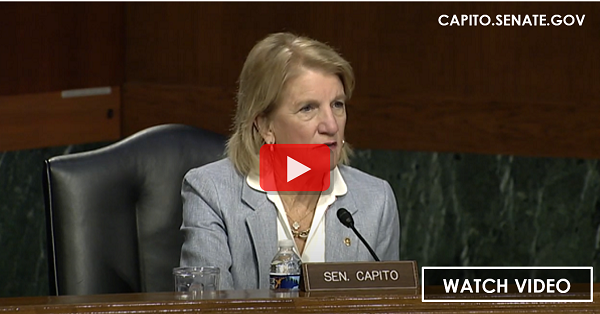 Click here or on the image above to learn more about the water infrastructure bills. Click here or on the image above to learn more about the water infrastructure bills.
Water infrastructure investment benefits the public health and economic success of our state. The bill also supports rehabilitation of our inland waterway infrastructure, such as locks and dams, and improvements to flood control projects. I’ve made sure to look out for smaller water systems, like many in southern West Virginia, by creating a new grant program that responds to their unique needs.
Learn more about the bill here.
Help for Local Governments
I’ve held dozens of teleconferences with community leaders, county commissioners, mayors, and more. I’ve also been in regular contact with Governor Jim Justice. Something that continues to come up is concern about revenue shortfalls resulting from the pandemic. That’s why I helped introduce the Coronavirus Relief Fund Flexibility Act, legislation that would allow the federal relief funds provided to state and local governments in the Coronavirus Aid, Relief, and Economic Security (CARES) Act to be used to replace revenue shortfalls resulting from the pandemic.
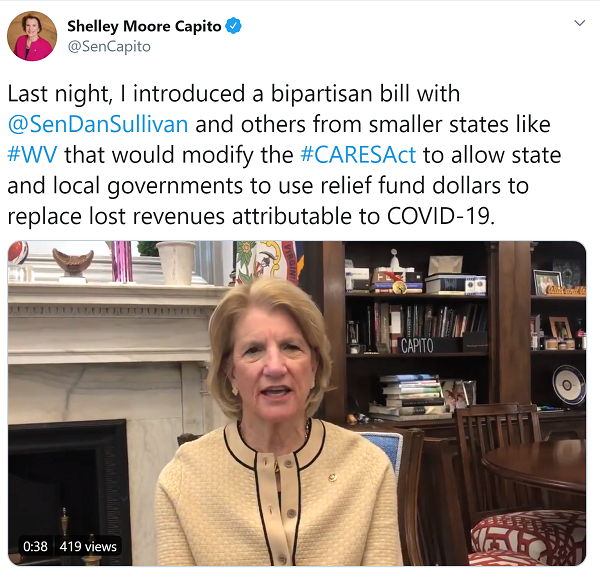 Learn more about the bill here or by clicking on the image above. Learn more about the bill here or by clicking on the image above.
West Virginia has received $1.25 billion of these funds for state and local governments under the CARES Act. The U.S. Treasury Department issued guidance restricting these resources from being directed toward revenue shortfalls. The Coronavirus Relief Fund Flexibility Act aims to clarify the matter by allowing state and local governments to use their CARES Act funding to make up for revenues lost due to COVID-19.
Let me be clear: this is not appropriating new money. This is clarifying how money we’ve already appropriated can be spent. We spent a lot of money on the coronavirus response, and I think we need to evaluate what’s working and what’s not before we spend any more.
I talked about this on Fox Business’ Mornings with Maria:

Allowing Flexibility for Broadband Deployment
Another bill I introduced this week was the Eliminating Barriers to Rural Internet Development Grant Eligibility (E-BRIDGE) Act, which would remove obstacles for broadband projects to receive Economic Development Administration (EDA) grants. Specifically, the legislation ensures that local communities can partner with the private sector and gives communities more flexibility in complying with their funding match requirements.
This is another way my Capito Connect initiative is working to get reliable, affordable coverage to our state.
Specifically, the bill would:
- Eliminate barriers to investments in broadband in distressed communities, making them eligible for EDA grants.
- Clarify that eligible recipients may include public-private partnerships and consortiums to leverage private sector expertise in project development.
- Provide flexibility in the procurement process to account for limited availability of broadband services in distressed communities.
- Clarify that funds can be combined with other federal resources.
- Provide flexibility on accounting for in-kind methods to meet non-federal cost share.
Learn more here.
REMINDER: Make Sure You Get Your Individual Check!
The IRS has opened an online portal for lower-income individuals who are not required to file a tax return, have not filed tax returns for 2018 or 2019, and are not on Social Security retirement, Social Security disability (SSDI), or Supplemental Security Income (SSI) to provide information in order to receive a stimulus check. Enter your information to track the status of your payment here.
Those who have filed a return for 2018 or 2019 or are on Social Security retirement, SSI, or SSDI do not need to do anything to receive their check.
However, if you’re on SSI and have dependents, you’ll need to fill out additional information to get the extra $500 per child.
Here’s a great Q&A page on the IRS site. If you have questions, check it out!
And here’s another good Q&A page that provides more details about your Economic Impact Payments (EIP).
Be Vigilant for Scammers!
Unfortunately, there are bad actors that are using this health crisis to take advantage of unsuspecting residents, especially our senior citizens. Please note the IRS WILL NOT call you and ask for your bank account information to deposit your individual relief check.
Check out my coronavirus webpage for more information about scams and what I’m doing to try and mitigate them.
Additional Resources
I created a page on my website with information and resources to keep you up-to-date on the coronavirus situation as it continues to evolve. Check out that page here, and please share with friends so they can keep up with the latest.
In addition to my webpage, I also want to make sure you know where to get the latest updates from the medical experts at CDC.gov and West Virginia DHHR.
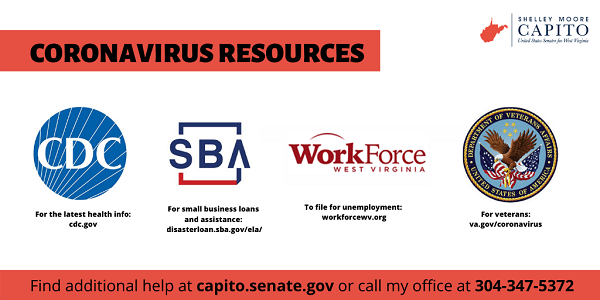
I will continue doing my best to keep you up to speed on what we are doing here at the federal level to help and other resources that can be useful back at home. I will be posting regular updates on my Facebook and Twitter accounts, so be sure to follow me there.
Important Information If You’re Visiting DC
Because of coronavirus concerns, all Capitol and White House tours have been suspended indefinitely. Please contact our Washington office to reschedule. Additionally, requests for flags flown over the Capitol may be delayed, and access to the Capitol and House and Senate office buildings is being restricted. Feel free to contact our office at (202) 224-6472 with any questions. We apologize for any inconvenience.
Counting on West Virginia
Have you taken your 2020 census yet? PLEASE DO!
Taking the census takes 10 minutes and could mean thousands of more federal dollars for West Virginia!
Do you part and take it here: https://my2020census.gov/
Over the past couple of months, I’ve been discussing the importance of taking the census, and I encourage you to do the same so you can spread the word to fellow West Virginians. Click here to read a column I wrote about this.
How Can We Help?
Whether you need help with a casework issue or have a question about scheduling a meeting at one of my offices, my staff and I are ready to assist you. Learn more about the services we offer at www.capito.senate.gov.
You can also submit your feedback and share your stories with me by visiting my “Share Your Stories” webpage here: www.capito.senate.gov/ShareYourStories.
Social Media Recap
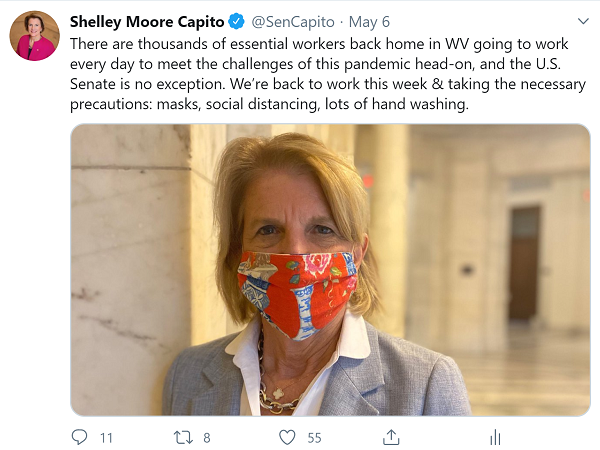
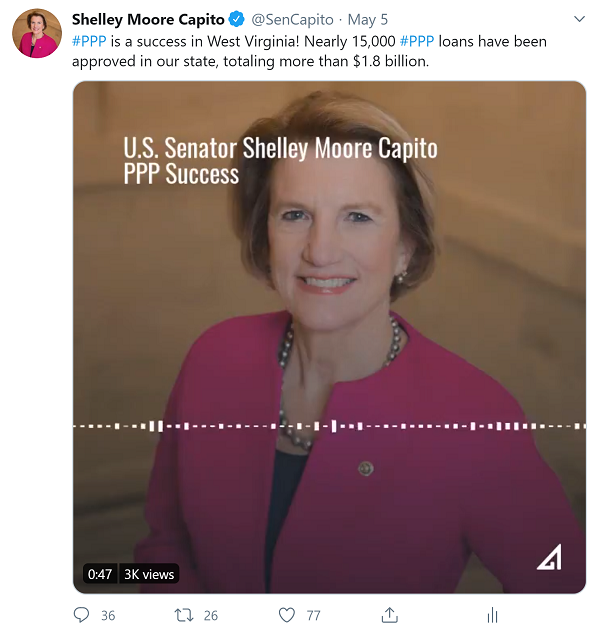
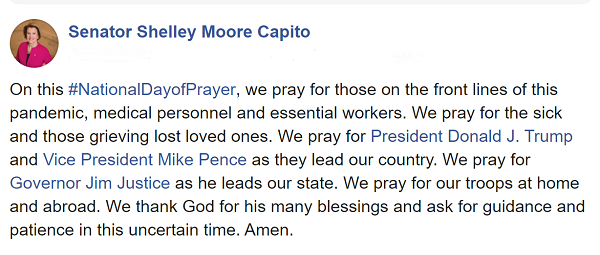
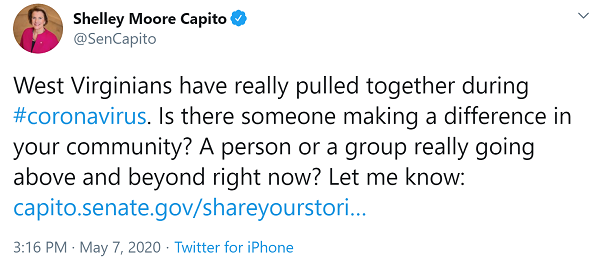
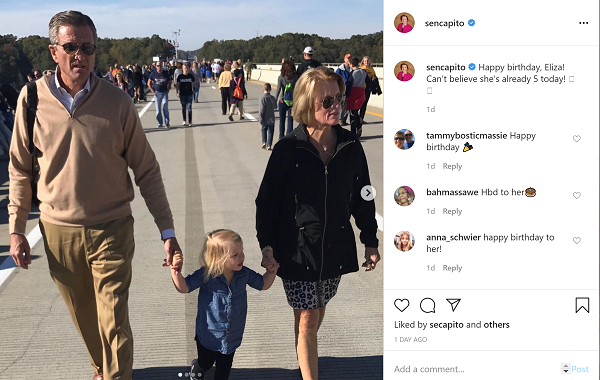
Join me on Facebook, Twitter, and Instagram for regular updates and photos.
Sincerely,

Shelley Moore Capito
United States Senator
|